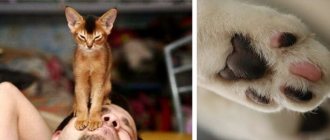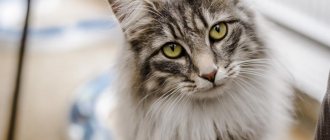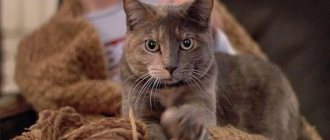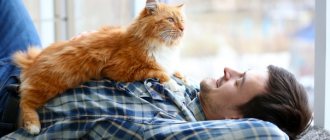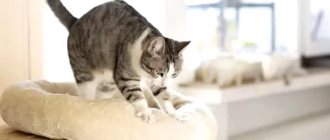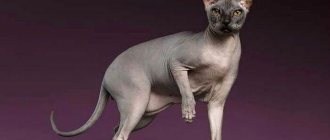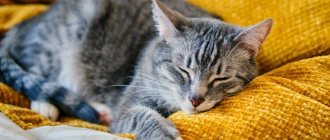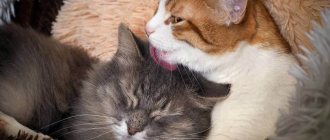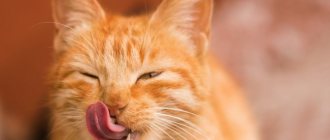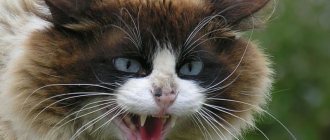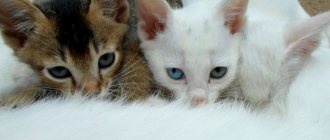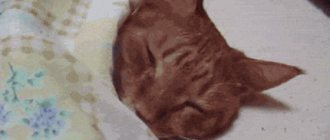Many people get cats to play with them and not feel lonely. At the same time, many people do not think about how much effort they need to take care of them. We are talking about feeding, haircut, bathing, and various hygiene procedures. But in return, owners can receive much more - the love and care of their pet. Sometimes this is expressed in the form of a cat touching a person’s body or clothing with its soft paws. But people do not always understand the reasons for such behavior and may even scold the cat for it. Therefore, next we will talk about why cats knead a person’s paws and how you can get rid of discomfort (if any).
Reasons for this behavior
Not everyone understands why cats paw at a person or go through his clothes. First of all, it is worth noting that a cat’s paws and whiskers are the main receptors for studying the surrounding world. For example, on the pads of the feet there are different glands that secrete special enzymes that help mark territory. There are other reasons why cats trample their owner or their future sleeping place with their paws:
- Stressful situations. If the cat has previously been taken to the veterinarian or given a bath, he may be worried. When a cat crushes a place or a person, it releases negative energy and relaxes;
- Understanding the world around us. There are special points on the pads of the paws that form tactile sensations. With their help, the pet learns about the world and objects around it. You should not be surprised if, before resting, the cat first examines the situation before getting comfortable;
- Mark the territory. There are also sweat glands on the cat's front paws that secrete enzymes. With their help, pets mark not only their territory, but also their objects and even people in order to ward off strangers;
- Pain or bad mood. Sometimes cats trample on a place, blanket or person with their paws when they feel unwell or experience discomfort. Since this action stimulates the production of endorphin - the hormone of happiness;
- They help and treat a person. If a cat itself comes to a person and moves its front paws, creating a feeling of massage, it means that the pet relieves you of negative energy and treats existing ailments. It has been said many times that cats have a therapeutic effect on human health;
- Milk step. If a cat kneads its owner, extends its claws and purrs at the same time, this is called a milk step. This action is a childish instinct, a memory of warmth and satiety, maternal love. Cats usually do this after a big meal or before bed;
- Expression of love and affection. Many cats trample or touch a person with their front paws, thereby expressing their love, care and reliability;
- One of the ancient instincts. Some experts believe that cats instinctively knead clothes or a certain place with their paws. After all, previously, animals in the wild studied in detail, “probing” the surface before settling down for the night.
The pet also shows this behavior after eating a tasty meal or before going to bed. And sometimes the reason lies in sexual desire, because during heat, cats tend to move their paws, purr, arch their backs, extend their claws and tear up furniture. This goes away on its own after a couple of weeks or when pregnancy occurs. If the cat marks the apartment at the same time, the solution may be sterilization or castration.
By the way, it is better not to distract your pet at this time, because he may be overly aggressive and even bite.
Are you about to be separated from your beloved pet?
Cat sitters Murchalkin will be happy to take care of your friend!
Cozy cat foster care
What cats don't trample on humans?
Not all cats paw at the blanket or press their owner's belly. It doesn't depend on the breed, it's just that not all purrs have this instinct. Don't worry if your pet doesn't give you a massage, this in no way means that he doesn't love you. Perhaps the kitten grew up without a mother and was bottle-fed, and therefore there was no need to stimulate milk production.
Interesting things on the site:
Top 15 calmest cat breeds
Hypoallergenic cat breeds
What should and should not be done?
Touching and kneading the owner with its paws is a natural behavior for every furry pet. You can’t blame him for this, just like:
- Punish;
- Use physical force;
- Limit your attention.
If a cat tramples with its paws and at the same time releases claws that scratch the skin or tear clothes, the owners can use the following techniques:
- It is necessary to trim the nails, but not too short;
- You can pet your pet;
- You can place a thick blanket under the cat's paws;
- It is worth lightly pressing on the front paws, which will force the pet to remove its claws;
- You can distract your pet's attention by showing his favorite toy;
- It is recommended to lay the cat on its side, stroking its head.
Massaging and purring a cat is the best manifestation of his attention and love. If you decide to punish your pet for this, you risk ruining your relationship with him forever and causing his aggression.
Unrealized sexual instinct
Why do some pets climb onto the bed, stomp on it, arching their backs and meowing loudly? This behavior is probably associated with the beginning of the mating season. You can recognize it by the fact that the cat tramples the sofa or bed not with its front paws, as usual, but with its hind paws, and the cat grabs the bedspread with its teeth.
This usually does not last long; after 10–14 days or with the onset of pregnancy, the fingering of the paws and expressive meowing stops. The male can be caught doing this activity at any time.
[custom_ads_shortcode3]
Therapeutic effect
When cats touch and crush a person with their paws, they share their energy and take away all the negativity. In addition, cat massage has other medicinal properties, due to which animals are used in medicine. Here are just a few facts:
- Cats help in the treatment of cerebral palsy, people with disabilities and autism;
- The strong energy field of animals can relieve people from the symptoms of chronic diseases;
- Felinotherapy is useful in the treatment of inflammation, gynecological problems and recovery after surgery;
- With constant contact with cats, people become less susceptible to infectious diseases;
- A cat's purring promotes bone tissue restoration and helps heal fractures;
- The sounds that a cat makes improve breathing, help fight stress and restore the nervous system.
It is worth noting the phenomenal intuition of furry pets, who subtly sense the approach of death and human illness. That is why they often come and lie on a sore spot on the body or near the bed of the dying person.
All these unique skills of pets must be appreciated by showing your attention and care for cats. Only then will they reciprocate and relieve you of headaches and stress.
Why do cats knead blankets with their paws?
It’s not uncommon for owners to notice how their pets actively trample the blanket with their paws before falling soundly asleep on it. This legitimately raises the question of why cats knead blankets with their paws. This behavior is not accidental and is caused by instincts that are inherent in the animal by nature. There are several explanations for this feature that the cat demonstrates. Knowing them, the owner will better understand his four-legged pet and will be able to establish especially close contact with him. Furry pets crumple things for various reasons.
Let's sum it up
It's no secret that cats are special animals that require respect and a lot of attention. But in return they are ready to give no less, for example, cats will always come to a person in a bad mood or during an exacerbation of chronic diseases. Cats also have special energy and are ready to share it with others. To do this, they knead the person with their paws and purr. For this reason, you should not scold, punish or beat a cat for such behavior. It’s better to thank him and reward him with a tasty treat.
If the cat produces its claws, damages furniture, or causes discomfort, you can use one of the recommendations described above. Although usually it will be enough to trim the claws and switch attention to your favorite toys. And the moment of sexual desire and estrus will just have to wait out, because sterilization is the last, desperate step!
Scientific explanation
- Instinct from childhood
When a cat gives birth to many kittens, her milk may not be enough. Then the babies press their paws on their mother’s stomach to get a drink. So it is likely that this is a habit from childhood. How do humans sleep in the fetal position (and cats too).
- Love for the owner
If an animal is taken away from its mother early, then this behavior is often observed towards the owner. This sign speaks of the closeness between a person and a four-legged pet. Also, a cat can often move its paws through a rug or blanket and purr.
- Genetic memory
Cats have long been domesticated animals, but their instincts are still preserved from ancient times, when they needed to survive in the wild and make their own homes. With the help of trampling, they took the grass and made their sleeping place more comfortable. Perhaps the cat is trampling in order to lie down and rest more comfortably.
The cat tramples with its paws
- Territory designation
Zoologists pay attention to the fact that cats have sweat glands on their paw pads. They produce sweat with a unique odor that humans cannot smell. But cats sense each other's signals perfectly. So this may be a way of “marking territory.”
- Good mood
Cats perfectly sense the emotional state, including the mood of their owner. If a person close to a cat is upset, she can start giving him a massage that causes the release of endorphins. The cat enjoys itself and supports its owner in difficult times.
- Mating season
Sometimes moving its paws can be a sign that your cat has entered mating season, which causes pets to behave completely differently. And if there is no potential partner nearby, the cat begins to be distracted by the owner. In such situations, you need to wait until the cat calms down, or find her a soul mate.
Cats trample with their front paws
Children's habit
You've probably noticed that when a cat massages a person, for some reason it purrs, squints and shows obvious pleasure. The fact is that the natural instincts inherent in cats remain with them throughout their lives.
In kittens, trampling with their paws is associated with receiving milk from the mother (lactation is enhanced by light pressure on the nipple area), and this, in addition to satiation, brings pleasure and joy of communication.
As pets grow older, their actions express trust in a person, associating him with his mother, in whose company he felt unusually calm and safe.
What canned food tastes best for cats?
RESEARCH ATTENTION! You and your cat can take part in it! If you live in Moscow or the Moscow region and are ready to regularly observe how and how much your cat eats, and also remember to write it all down, you will receive FREE SET OF WET FOOD.
Project for 3–4 months. Organizer - Petkorm LLC.
Cat lovers know that sometimes a cat begins to trample its owner or a toy with its paws, while its eyes are closed and it purrs loudly. Sometimes cats trample each other in this way. Not everyone understands why a cat tramples you with its paws and behaves this way? What is the meaning of this cat behavior? Why does a cat massage with its paws and why does it give it pleasure, because it is quite obvious that your cat is very happy at the same time.
Everything is very simple. This behavior of a cat is easily explained and is the norm for a cat. The owner should know about this.
Why do cats trample us with their paws?
From birth, instincts govern the behavior of a living creature. Kitten activity is no exception. Immediately after birth, the instinct of a newborn animal makes it look for its mother. A blind newborn kitten finds milk by smell. From this moment his life begins outside the womb. Now he must feed himself and gradually learn to be independent. But for now, during the first weeks of its life, the kitten is under the protection of its mother. A good cat is very attentive to her children.
It must be said that the process of obtaining food gives the kitten great pleasure, although it forces him to work hard. A well-developed sucking reflex allows a healthy kitten to quickly receive warm, optimally suited mother's cat milk. In order to quickly get enough and overcome the resistance of the mother's flesh, the kitten instinctively begins to massage the mother's belly, thus receiving more milk.
The most active kittens spread their paws wide and alternately press strongly with their front paws on the mother's stomach. This behavior is accompanied by faster milk production, which gives the kitten great pleasure. In the future, this relationship: massage with paws - receiving pleasure, is firmly fixed in the kitten’s mind. As cats grow, the habit of trampling their paws does not go away. On the contrary, they happily massage you with their paws, trample on your favorite soft blanket, closing their eyes and purring loudly.
Milky step
This behavior of cats is called the “milk step”, i.e. an instinct established from the moment of birth, when stomping helped the kitten to receive mother's milk. The milk step lasts for a cat's entire life. Cats love to massage their beloved owner, or a soft toy, or their playmate if there are several animals in the house.
The cat's milk step is a special form of confidential communication between the owner and his pet.
If the cat trusts you, he will trample you with his paws, purring enthusiastically. This behavior is not always understandable to cat owners. Some people don't like it. This is due to the fact that some cats like to massage their owner's chest or neck with their paws. At the same time, they release their claws and leave marks and even scratches on the delicate human skin. But you should not scold a cat for showing love. If the cat is practicing the milk step on your skin, then at this moment he needs to be carefully moved to a blanket or the arm of the sofa, where he can calmly continue his trampling and will not harm you. At the same time, the cat gets great pleasure, you should not interfere with this, much less scold the cat for taking a milky step. At this moment, he feels like the same little and beloved mother’s kitten, who is fed, satisfied and completely protected from the vicissitudes of fate.
Love your cat correctly, allow him to show his natural instincts, including the milky step. A cat that is scolded for trampling may become nervous and aggressive. Such a cat will stop trusting you if you pull him back when he is stomping around with his eyes closed. The milk step for a cat is a kind of psychological release. A cat can practice the milk step several times a day. This is considered normal and does not require adjustment. Some cats love to climb into their owner's arms and stomp on his stomach or chest. Most owners are delighted with this display of love and happily hug and stroke their cat while it stomps and purrs. This cat is truly happy. He knows that he is loved and appreciated, and calmly shows his owner that he can give him pleasure.
At the same time, there are cats that do not have a milk step. This may be due to the artificial feeding of the kitten or to its psychological characteristics. Just as there are cats that do not purr, there are also those that do not remember the milk step and do not trample their owner. This is also normal behavior for your cat. All animals, like people, are individuals. You need to respect their habits, know the peculiarities of cat behavior and not make unforgivable mistakes in their maintenance. A cat whose voice is raised, pushed and kicked will be nervous and will begin to defend itself, showing aggression and doing things that will be unpleasant to its owner. But a cat’s misbehavior is the result of a misunderstanding by its owner. That is why, before getting a cat, you need to learn more about its psychology and the characteristics of a particular cat breed.
By the way, there is an opinion that when a cat tramples you with its paws and purrs, you also calm down and your worldview becomes more harmonious. For example, in Britain, there is even a service, communication with a cat for a fee, when a city resident is brought a good, calm, sociable cat, which actually, according to this agreement, works for the customer as a cat: she purrs, tramples him with her paws, talks to him as best she can, thus most calming and putting him in a favorable mood. At this time, thoughts are organized, a person begins to treat everything more thoughtfully and calmly.
A person needs a cat to work as a cat and help relieve the negative consequences of an urbanized lifestyle. Affectionate, trusting cats are an excellent cure for stress. At the same time, a cat is always a hot living heating pad that will be next to you as soon as you lie down. Love your cat, pamper her, pet her and pick her up. Then both you and your cat will be healthy and happy.
When this phenomenon occurs
Animal psychologists identify two reasons for trampling: instincts and a manifestation of love for the owner.
Instincts include actions when cats:
- mark territory (sweat glands on paw pads);
- getting ready for bed (checking for comfort);
- during the period of heat (trying to attract attention).
But there are also conscious reasons why they can stagnate:
- show their devotion;
- have a healing effect on themselves or the owner;
- for the sake of obtaining the pleasure hormone - endorphin.
Mechanism
How does a cat’s “purr” work, and what is it anyway? Have you ever wondered how kittens create this sound and why people like it so much? There are several theories about the origin of purring.
Vocal cords
Taking a closer look at your animal, you will probably think that the tummy makes a continuous sound. But that's not true. There is an opinion that a cat purrs precisely through the vocal cords, but the process “starts” in the cerebral cortex. The muscles of the larynx, at the behest of the animal, begin to vibrate sweetly and emit a soothing and pleasing purr (or, conversely, the battle cry of meowing).
Diaphragm
Scientists also believe that purring sounds come from the diaphragm or, more simply, from the lungs. That is, they are provoked by vibrations in the cat’s lungs. Experts think this because the cat purrs in time with its breathing. This set the stage for thought.
Vascular theory
The vascular theory states that the “clattering” occurs due to the pressure created in the cat's body by the blood circulation. Under the influence of certain emotions, the pressure difference causes the chest to vibrate and the cat makes the very sounds that we hear and call “purring.”
These are mysterious animals! And yet, scientists have solved the mystery! The vibration spreading throughout the body comes from the hyoid bones. They are located between the base of the skull and the base of the tongue of animals.
Reference! It is because of the contraction of the muscles of the vocal cords that vibration occurs, accompanied by pleasant purring sounds.
Bed troubles
Modern science knows that domestic cats descend from several subspecies of wild cats that lived in the steppes, mountains and deserts.
At night they hunted small game, and during the day they usually rested and digested a meal, making a cozy den for themselves in the thickets or tall grass.
So stomping cats before bed can mean preparing the sleeping area, removing unnecessary blades of grass and branches, and leveling the ground.
Many zoologists are inclined to believe that domestic cats still retain this instinct at the genetic level. Thus, the trampling of your favorite blanket by a domestic cat means that a sleeping place will soon be built there.
Unconfirmed assumptions
The remaining reasons are considered unconfirmed assumptions. They also explain why cats knead their paws, but they have some nuances that do not allow them to be classified as the main ones.
Marking territory
The sweat glands of mustachioed pets are located directly on the pads of their paws, so in the heat they leave wet marks on the tiles. In addition to cooling the body, the enzymes released help repel uninvited guests. This feature is actively used for marking territories. Most often, females resort to it, since males spray an odorous secretion when urinating.
Stress relief
Cats often crumple a soft blanket or rug after they have been deprived or offended in some way. For example, they did not give a piece of sausage from the dinner table, although the animal begged for it with all its might. They woke you up or forced you to leave your favorite and already warm place. In this case, the pet often begins to intensively crush various interior items with its paws, however, it does not begin to purr.
Cats crush a person with their paws, splashing out negative emotions. The pet tries to improve his own mood. Often, after stomping around on the blanket for a while, the cat returns to its owner and lies down next to him - this is how the animal shows that it is no longer angry and is ready to continue friendly communication with the person.
Instinctive preparation of a place to rest
Before the domestication process began, cats made their own places to sleep. Often, in order to lie down comfortably, one had to crush the bristling grass with one’s paws. It was also important to make sure the bed was safe for future relaxation.
Cats are by nature cautious and selective - the predatory instincts of wild animals are alive in them and are not reduced. By pressing his owner's paws, the cat checks whether his body is safe enough to relax and fall asleep. With this action, cats may not purr, silently preparing a place for themselves to rest.
We suggest you read: Anatomy of the internal organs of a cat
Marriage span
Cats are always overly active when their mating season begins - they immediately physiologically feel that it is time to have offspring. At this time, your little friend is most active. The cat becomes very active, can move its paws a lot, arch its back and perform additional actions. That's why cats knead a person's paws and purr - perhaps your pet wants to tell you something. Do not react aggressively to the cat's behavior during this period - she may bite and become very angry. After pregnancy begins, the cat’s activity will begin to decline.
The highest measure of affection
The cat sits comfortably on the owner's chest or on his lap. Then she moves her paws, extending her claws a little. Scientists have amazed all lovers of these pets. It turns out that in this way the furry ones show complete contentment and their love. This habit appears in cats from a young age.
The kitten settles comfortably near its mother’s belly, pressing its paws on the nipple as it drinks milk. Naturally, the pet does not at all strive to provoke the release of goodies from its owner. However, eating in any animal has always been associated with pleasure and joy, which is why a childish reflex appears. After all, in a way, the cat owner replaces the furry animal’s mother.
Some kittens are so emotional that if they stomp on their stomachs, they may also purr or drool.
If a cat and a person interact, it is beneficial for both parties. Zoologists have proven that a cat evokes only positive emotions in humans. If an animal is nearby, it helps to cope with various kinds of stress and negative well-being. In addition, stomping your paws on the stomach will help cope with diseases of the nerves and heart.
Under no circumstances should you drive away a cat when it is crushing you with its paws. The pet will not be able to understand why he was driven away, because he confessed his love to his beloved owner. And if the cat gets so carried away that he lets out his claws and starts scratching your stomach or neck, you can distract your pet with some kind of toy or a blanket.
Massotherapy
Surprisingly, cats can not only relieve stress, but also give you a soft and pleasant massage with their paws. What does it mean when a cat kneads its paws - it is simply trying to thank you for a delicious dinner or for showing concern for it. The therapeutic effect comes not only from the cat massaging different parts of the body, but also from its purring during the process itself.
This helps a person to rest and relax after a difficult day. Some owners, for the sake of cat trampling, are ready to endure “accidental scratches” that they may accidentally receive during a massage.
Animal marks territory
When cats trample on the couch, they may be trying to secure sole ownership of the bed. Why did the cat need furniture? On the pads of their paws there are sweat glands that secrete special odorous substances, with the help of which these animals mark the territory so that rivals do not lay claim to it. Probably, appreciating the comfort and softness of the bed for rest and wanting to sleep on it all the time, animals try to make their desire obvious to others by moving their paws.
[custom_ads_shortcode1]
What does claw extension mean?
While performing the “milk step,” the animal’s body relaxes and the function of retracting and extending its claws is involuntarily triggered.
While trampling, a cat may release its claws, involuntarily injuring a person. But you shouldn’t be offended by this impulse of your pet. This is another manifestation of cat love.
